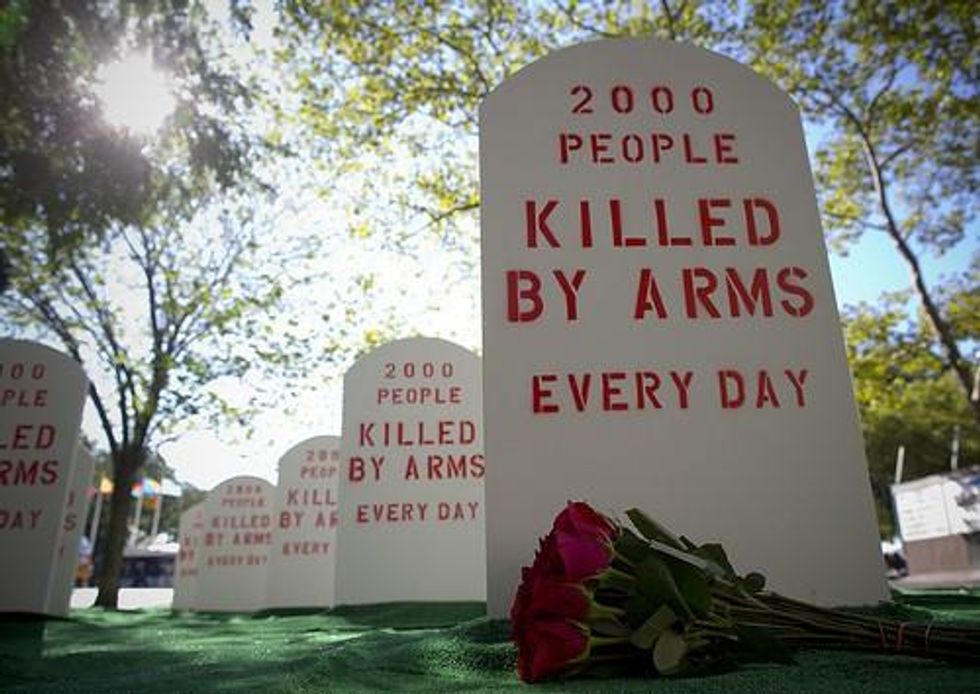

SUBSCRIBE TO OUR FREE NEWSLETTER
Daily news & progressive opinion—funded by the people, not the corporations—delivered straight to your inbox.
5
#000000
#FFFFFF
To donate by check, phone, or other method, see our More Ways to Give page.


Daily news & progressive opinion—funded by the people, not the corporations—delivered straight to your inbox.
More than 65 countries have signed the first-ever treaty regulating the global arms trade. The United States, which is the world's top arms exporter, has delayed signing it after being accused of weakening the treaty before its approval last month.

Secretary of State John Kerry said Monday the United States would sign as soon as the official translation process is complete. The treaty would not control domestic weapons use but still faces a tough battle for ratification in the U.S. Senate. On Monday, U.N. Secretary-General Ban Ki-moon urged countries that export arms to embrace the treaty.
Ban Ki-moon: "I particularly appeal to major arms trading countries to be first movers. The eyes of the world are watching arms traders, manufacturers and governments as never before. I call on all governments to bring national legislation and procedures in line with the requirements of the treaty so that it becomes a strong force for security and development for all."
Dear Common Dreams reader, The U.S. is on a fast track to authoritarianism like nothing I've ever seen. Meanwhile, corporate news outlets are utterly capitulating to Trump, twisting their coverage to avoid drawing his ire while lining up to stuff cash in his pockets. That's why I believe that Common Dreams is doing the best and most consequential reporting that we've ever done. Our small but mighty team is a progressive reporting powerhouse, covering the news every day that the corporate media never will. Our mission has always been simple: To inform. To inspire. And to ignite change for the common good. Now here's the key piece that I want all our readers to understand: None of this would be possible without your financial support. That's not just some fundraising cliche. It's the absolute and literal truth. We don't accept corporate advertising and never will. We don't have a paywall because we don't think people should be blocked from critical news based on their ability to pay. Everything we do is funded by the donations of readers like you. Will you donate now to help power the nonprofit, independent reporting of Common Dreams? Thank you for being a vital member of our community. Together, we can keep independent journalism alive when it’s needed most. - Craig Brown, Co-founder |

Secretary of State John Kerry said Monday the United States would sign as soon as the official translation process is complete. The treaty would not control domestic weapons use but still faces a tough battle for ratification in the U.S. Senate. On Monday, U.N. Secretary-General Ban Ki-moon urged countries that export arms to embrace the treaty.
Ban Ki-moon: "I particularly appeal to major arms trading countries to be first movers. The eyes of the world are watching arms traders, manufacturers and governments as never before. I call on all governments to bring national legislation and procedures in line with the requirements of the treaty so that it becomes a strong force for security and development for all."

Secretary of State John Kerry said Monday the United States would sign as soon as the official translation process is complete. The treaty would not control domestic weapons use but still faces a tough battle for ratification in the U.S. Senate. On Monday, U.N. Secretary-General Ban Ki-moon urged countries that export arms to embrace the treaty.
Ban Ki-moon: "I particularly appeal to major arms trading countries to be first movers. The eyes of the world are watching arms traders, manufacturers and governments as never before. I call on all governments to bring national legislation and procedures in line with the requirements of the treaty so that it becomes a strong force for security and development for all."